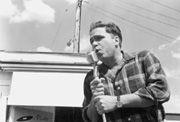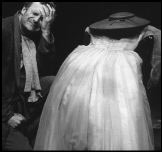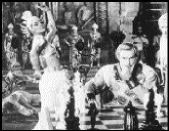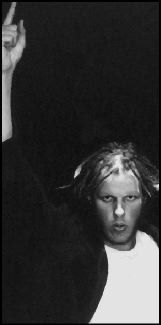YOU CAN BE FORGIVEN if you expect Two Family House to wear thin quickly. The story of a lovable loser fighting for his dream in 1950s Staten Island suggests strained treacle. But in this Sundance award-winner, comfort comes from the lack of big surprises.
TWO FAMILY HOUSE
written and directed by Raymond De Felitta with Michael Rispoli, Kelly Macdonald, and Kathrine Narducci opens October 27 at Broadway Market
Buddy Visalo (Michael Rispoli of The Sopranos) is built like a milk can but has a butter-smooth tenor voice. He delivers his lounge act patter to the mirror, trying to relive his lost opportunity to croon on the Arthur Godfrey show. Now, he hopes only to buy a house, live upstairs, and turn the bottom half into a bar where he can perform. His wife Estelle (Kathrine Narducci), in pleated dress and high heels, complains to the neighborhood of Buddy’s fecklessness. “Some guys, it’s like they’re destined for success,” she wails. “Buddy, he’s pregnant with failure.”
To improve his life, Buddy has to make someone else’s worse. An unpleasant Irish couple already lives in the house he purchases: a drunkard and his pregnant wife Mary (Kelly Macdonald). Will he evict them? Buddy shambles through his existence in the most well-meaning way, trying to do what’s expected of him—yet not without qualms and conscience. “I’m just like anyone else, most of the time,” he protests, but it’s also a complaint that his better aspirations and inclinations are being smothered by the world.
His dual nature is soon tested when Mary is abandoned with her new baby and a bad reputation. She questions Buddy’s motives every time he tries to help and never stops calling him “Mr. Visalo.” In this role, Macdonald’s unconventional beauty is riveting, with a face like vanilla pudding. As she opens up, she seems to grow younger, and her pale cheeks gain a faint strawberry flush.
Two Family‘s familiar milieu and characters might have easily resulted in sentimental melodrama. However, at every juncture where the film threatens a fatal, sticky collision, writer-director Raymond De Felitta deftly steers to a gentle graze. He trusts his characters and wisely stays out of their way. His only failures are when he retreats from that plan, with infrequent but intrusive narration that muddies our point of view.
As Buddy finds leaded glass under the plywood in his home, De Felitta’s uniformly strong cast uncovers the richness of their characters. (In lesser hands than Narducci’s, it would be easy to hate Estelle for dousing her husband’s ambitions, but she just has her own notions of success.) Also like an old house, it’s the soundness of Two Family‘s framing that counts, making for a delightfully warm, well-wrought romance.








